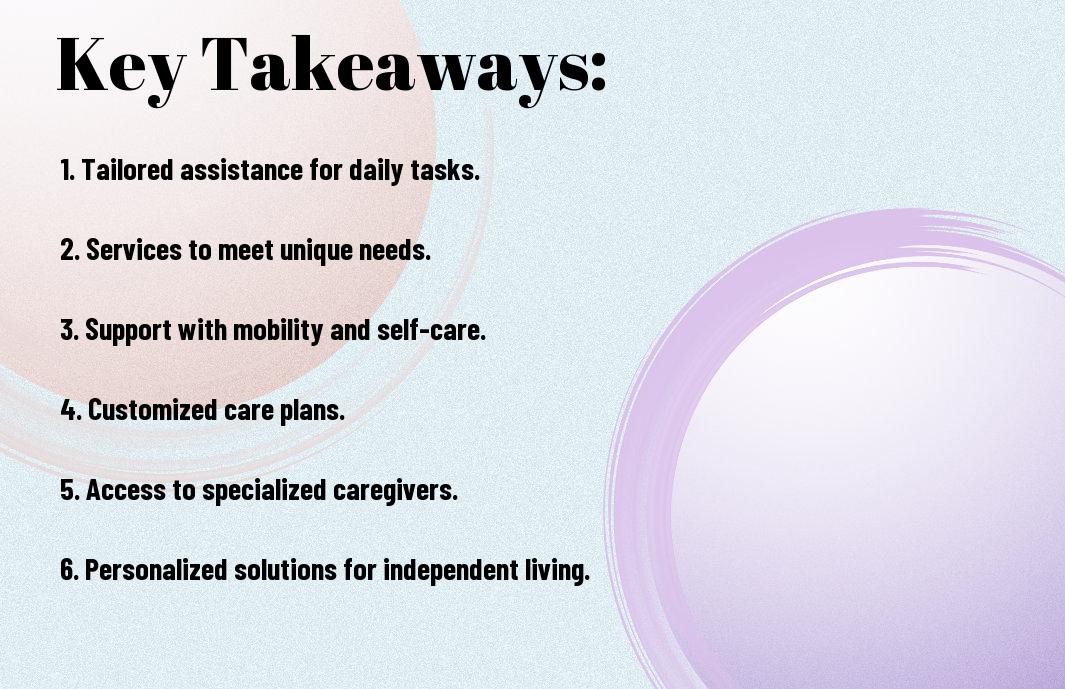
Most individuals can benefit from personalized support to enhance their daily living experiences. From meal delivery services for older adults to virtual therapy sessions for individuals with mental health concerns, a range of tailored services exist to cater to unique needs. Understanding the personalized support options available can greatly improve the quality of life for many individuals seeking assistance in their daily routines.
Key Takeaways:
- Personalized Care Plans: Individuals can receive personalized support for daily living through customized care plans that address their specific needs and preferences.
- Home Health Services: Services such as home health aides, skilled nursing, and therapy can be provided in the comfort of one’s home to assist with daily activities and promote independence.
- Technology-Assisted Support: Technological advancements like smart home devices, telemedicine, and wearable sensors offer innovative ways to enhance daily living and ensure safety and well-being.

Types of Personalized Support
Before submerging into the types of personalized support available for daily living, it’s necessary to understand the range of options that cater to individual needs. Whether you or a loved one requires personalized support for daily living, there are various services designed to help maintain independence and enhance quality of life. Any guidance or assistance can make a significant difference in promoting well-being and comfort.
| In-Home Care | Adult Day Care |
| Assistance with daily activities within the comfort of your own home. | Social and recreational activities in a supervised group setting. |
| Personalized care plans tailored to individual needs. | Opportunities for social engagement and mental stimulation. |
| Flexible scheduling and support from trained caregivers. | Relief for family caregivers and a supportive environment for seniors. |
| Promotes independence while ensuring safety and well-being. | Structured programs to enhance physical and cognitive health. |
In-Home Care
An integral part of personalized support for daily living is in-home care. This service provides assistance with daily activities such as grooming, meal preparation, medication reminders, and light housekeeping within the familiar surroundings of one’s home. Care plans are tailored to meet individual needs, ensuring that each person receives the specific support required to maintain independence and quality of life.
Adult Day Care
To complement in-home care or provide a social outlet for seniors, adult day care offers supervised group activities in a community setting. Participants engage in social interactions, recreational programs, and mental stimulation under the care of trained professionals. For instance, adult day care centers provide a safe and supportive environment for seniors, giving family caregivers peace of mind knowing their loved ones are well cared for during the day.
Respite Care
Caregiving can be physically and emotionally demanding, which is why respite care is crucial for providing temporary relief to family caregivers. This service allows caregivers to take a break while their loved ones receive professional care in a supportive environment. Plus, respite care programs ensure that seniors continue to receive the necessary assistance and supervision, promoting their well-being and overall health.
Based on the variety of personalized support options available, it’s clear that tailored care plans and structured programs play a vital role in enhancing the lives of individuals needing assistance with daily living activities. Whether choosing in-home care, adult day care, or respite care, each service offers unique benefits aimed at providing comfort, social engagement, and specialized support.
Support for Daily Tasks
Assistance with Activities of Daily Living (ADLs)
There’s a range of personalized support available for individuals who need assistance with Activities of Daily Living (ADLs). These imperative tasks include bathing, dressing, eating, toileting, and transferring. For individuals who require help with ADLs, caregivers and support services can provide hands-on assistance to ensure these activities are completed safely and with dignity.
Instrumental Activities of Daily Living (IADLs)
With Instrumental Activities of Daily Living (IADLs), individuals may require support with more complex tasks such as meal preparation, medication management, housekeeping, transportation, and managing finances. Caregivers can offer personalized assistance tailored to the individual’s needs, helping them maintain their independence and quality of life in their own homes.
It’s crucial to note that IADLs are higher-level activities that enable individuals to live independently in the community and engage in activities that support daily life.
Managing Medications
Daily medication management is vital for many individuals to maintain their health and well-being. With personalized support, individuals can receive assistance in organizing their medications, adhering to prescribed schedules, and understanding potential side effects.
Assistance with managing medications can help prevent medication errors, ensure proper dosages are taken, and promote better health outcomes for individuals who rely on multiple prescriptions.
Nutrition and Meal Support
Despite various challenges individuals may face in their daily lives, there are personalized support options available to ensure they receive adequate nutrition and meal assistance. Whether it’s due to physical limitations, busy schedules, or dietary restrictions, there are services and programs designed to help individuals maintain a healthy diet and meet their nutritional needs.
Meal Preparation and Delivery
To address the challenges of preparing meals independently, some individuals may benefit from meal preparation and delivery services. These services can provide convenient, nutritious meals tailored to individual dietary needs and preferences. By opting for meal delivery, individuals can save time and effort while ensuring they have access to healthy, balanced meals.
Nutrition Counseling
With the help of nutrition counseling, individuals can receive personalized guidance on their dietary choices and nutritional needs. Professional nutritionists can work with individuals to develop meal plans, set dietary goals, and address any concerns or challenges related to nutrition. This personalized support can help individuals make informed decisions about their diet and overall health.
Nutrition counseling plays a crucial role in promoting healthy eating habits and ensuring individuals are meeting their nutritional requirements.
Special Dietary Needs
Special dietary needs, such as food allergies, intolerances, or medical conditions, require personalized attention to ensure individuals are consuming safe and appropriate foods. Services and programs catering to individuals with special dietary needs can provide customized meal plans and educational resources to help manage these dietary restrictions.
For instance, individuals with diabetes may benefit from personalized meal plans that consider their blood sugar levels and carbohydrate intake to help regulate their condition effectively.

Personal Care and Hygiene
Bathing and Grooming
Personal hygiene is crucial for maintaining health and well-being. Assistance with bathing and grooming is often provided to individuals who may have difficulty performing these tasks independently. Caregivers can help in ensuring that the individual is able to bathe safely and maintain good hygiene practices.
Dressing and Undressing
With the help of caregivers or personal support workers, individuals can receive assistance with dressing and undressing as needed. This support ensures that individuals can comfortably and safely manage their clothing, promoting independence and dignity in daily living activities.
Dressing appropriately for the weather and occasion is important for both comfort and confidence. Caregivers can assist individuals in selecting appropriate clothing and getting dressed in a manner that suits their personal style and preferences.
Incontinence Care
Care for individuals with incontinence issues involves compassionate and respectful assistance with managing bladder or bowel control. Caregivers can help maintain cleanliness, provide support with changing undergarments or adult diapers, and ensure the individual’s comfort and dignity.
Grooming services can include assistance with hair care, shaving, nail trimming, and other personal grooming tasks to help individuals look and feel their best. Caregivers can support individuals in maintaining their personal hygiene routines and overall well-being.

Household and Errand Support
After considering personalized support for daily living, household and errand assistance can make a significant difference in maintaining independence and quality of life. From light housekeeping to running errands, these services can provide invaluable help to individuals needing assistance with daily tasks.
Light Housekeeping
The light housekeeping services typically include tasks such as dusting, vacuuming, mopping floors, and tidying up living spaces. This assistance can help individuals maintain a clean and organized home environment without the physical strain of heavy cleaning tasks.
Laundry and Linen Services
Light laundry and linen services involve washing, drying, folding, and storing clothes and linens. This service can be a relief for individuals who may have difficulty managing laundry tasks independently, ensuring they always have clean clothes and bedding available.
Plus, the laundry and linen service may also include tasks such as ironing, mending clothes, and changing bed linens, providing comprehensive assistance with all laundry needs.
Grocery Shopping and Errands
For individuals who may have trouble getting to the store or running errands, grocery shopping and errand services can be a lifeline. Caregivers can help with grocery shopping, picking up prescriptions, and other vital errands, ensuring that individuals have everything they need without having to leave their home.
Errand services can also include tasks such as mailing packages, dropping off dry cleaning, and picking up prescriptions, offering a wide range of support for daily tasks that can become challenging for some individuals.
The personalized support available for daily living can truly make a difference in the lives of individuals needing assistance with various household tasks and errands, allowing them to maintain their independence and quality of life.
What Types of Personalized Support Can Home Health Care Provide for Daily Living?
Home health care disabilities can provide personalized support for daily living, including assistance with bathing, dressing, meal preparation, and medication management. In-home caregivers can also offer companionship and help with mobility for individuals with disabilities, allowing them to maintain their independence and live comfortably in their own homes.
Social Interaction and Companionship
Many individuals benefit greatly from personalized support that includes social interaction and companionship to enhance their daily living experiences. This type of support can improve overall well-being and quality of life for those who may feel isolated or lonely.
Companion Care
Care from a companion can involve spending time with an individual, engaging in conversation, playing games, or accompanying them on walks. These activities can be vital for providing emotional support and reducing feelings of loneliness. Companion care providers can also assist with light household tasks and meal preparation, offering a holistic approach to daily living support.
Social Activities and Outings
Companion services often include organizing social activities and outings for individuals to participate in. This could involve visits to local community centers, attending cultural events, or simply going for a leisurely stroll in the park. These outings can help individuals stay connected with their community, reduce feelings of isolation, and promote a sense of belonging.
Participating in social activities and outings can also stimulate mental and physical well-being, providing opportunities for social interaction and creating lasting memories.
Phone and Video Calls
On top of in-person interactions, companion care services may also offer support through regular phone or video calls. These virtual connections can be crucial for individuals who may not have easy access to in-person companionship. Through phone and video calls, individuals can engage in conversations, receive emotional support, and stay connected to their support network.
Understanding the importance of social interaction and companionship in daily living support is crucial for providing personalized care that addresses the holistic needs of individuals seeking assistance with their daily activities.
Conclusion
Presently, it is evident that there is a wide range of personalized support available for daily living, especially for the elderly. Services such as personalized home care offer a multitude of benefits, including assistance with activities of daily living, companionship, medication management, and much more. Individuals can maintain their independence and quality of life while receiving the necessary support to thrive in the comfort of their own homes.
For more information on what personalized home care can offer to the elderly, visit What Can Personalized Home Care Offer to the Elderly. It is crucial to explore these options and find the right support that aligns with individual needs and preferences to promote overall well-being and happiness.
FAQ
Q: What is personalized support for daily living?
A: Personalized support for daily living refers to tailored assistance and services designed to meet individual needs and preferences to help individuals with tasks related to daily living activities.
Q: Why is personalized support important for daily living?
A: Personalized support is crucial because it allows individuals to maintain independence, improve quality of life, and receive assistance that meets their unique requirements.
Q: What are the different types of personalized support available for daily living?
A: Personalized support for daily living can include services such as home care assistance, meal preparation, medication reminders, transportation services, and companionship.
Q: How can one access personalized support for daily living?
A: Personalized support services can be accessed through home care agencies, community organizations, healthcare providers, and online platforms that connect individuals with caregivers and support services.
Q: Who can benefit from personalized support for daily living?
A: Individuals who may benefit from personalized support for daily living include older adults, individuals with disabilities, those recovering from illness or injury, and anyone needing assistance with daily tasks.
Q: How is personalized support tailored to individual needs?
A: Personalized support is tailored to individual needs through assessments, care planning, regular evaluations, and ongoing communication to ensure that services meet the evolving needs and preferences of each individual.
Q: What are the benefits of personalized support for daily living?
A: The benefits of personalized support for daily living include increased independence, improved safety, enhanced quality of life, peace of mind for families, and the ability to age in place comfortably.


No Comments